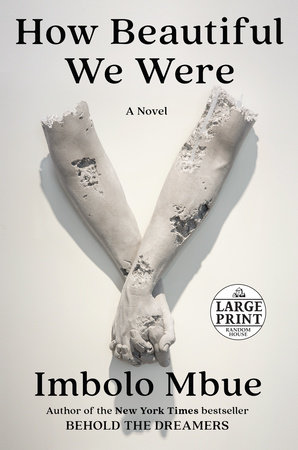We should have known the end was near. How could we not have known? When the sky began to pour acid and rivers began to turn green, we should have known our land would soon be dead. Then again, how could we have known when they didn't want us to know? When we began to wobble and stagger, tumbling and snapping the feeble little branches, they told us it would soon be over, that we would all be well in no time. They asked us to come to village meetings, to talk about it. They told us we had to trust them.
In the small village of Kosawa, in an unnamed African nation that presumably resembles author Imbolo Mbue's native Cameroon, the water and soil have been poisoned by an oil company called Pexton. The children of the village are becoming gravely ill, and often dying; pleas to the company to clean up the land fall on deaf ears, and the village chief is in the pocket of the oil barons. It's the town madman who pushes the village to finally take matters into his own hands: during a visit from Pexton's ambassadors, he nicks the key to their truck, knowing that for ritual reasons no one will dare touch him. Suddenly the town leaders find themselves having kidnapped three of the company's employees, a situation which presents both great opportunity and great danger.
This scenario, which I really liked, makes up the first third of the novel, and turns out to be rather inconclusive, as all kinds of real-world activism really are. The immediacy and intensity of the hostage scenario gives way to what I thought was a much weaker novel about the education of Thula, a young girl when the hostages are taken, who goes to America and comes back to Africa as a firebrand intent on bringing political change to her country. The bulk of How Beautiful We Were was, I thought, marred by bad literary choices, beginning with the novel's structure, which is composed of several first-person sections written by villagers. Their own stories can be detailed and engaging, but they felt to me ultimately a distraction from what's clearly meant to the main narrative, which happens at a bird's-eye view that robs it of specificity and detail.
Several of these sections are written from the perspective of "The Children," a collective of Thula's "age-mates." I really loved this at first, but over the course of the novel it forces Mbue into authorial positions that just don't work: she uses a series of ham-fisted letters from Thula to the Children in order to inform us of the progress of her education, for example. Later, when the Children splinter, having argued about the morality and efficacy of the violent methods the employ to supplement Thula's political activism, the internal logic of these sections breaks down almost completely.
I didn't think this book worked, honestly. But when it's at its best, it presents complex and interesting questions about how oppressed peoples in the Third World can and should fight back. During the hostage scenario, a team of envoys travels to the nation's capital to convince an American journalist to write about them; the outrage in the U.S. over the village's plight leads to an arrangement with the oil company and an NGO called the "Restoration Movement" that brings a measure of progress. But Thula returns understanding that only political change will make a difference; her non-violent campaigns are contrasted with the gun-happy "Children," in a way that seemed a little jejune to me but not without knowledge or understanding.
I have an ongoing project to read a book from every country. How Beautiful We Were falls in sort of a gray area: though born in Cameroon, Mbue lives in and wrote the book in America. But perhaps this is offset by the African setting of the novel, so I'm counting this for Cameroon, which puts me at 50 countries.


No comments:
Post a Comment